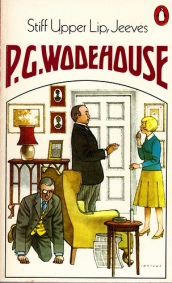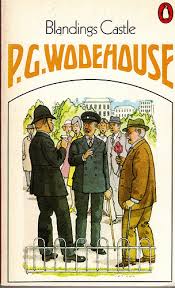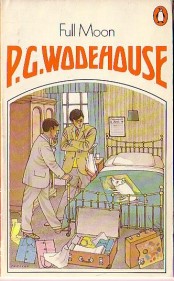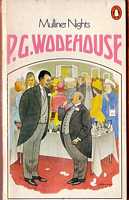“I believe there are two ways of writing novels. One is making a sort of musical comedy without music and ignoring real life altogether; the other is going deep down into life and not caring a damn…”
P. G. Wodehouse
I discovered P. G. Wodehouse when I was eighteen or nineteen. I was studying engineering, staying at my ancestral home at Thrissur. This house was built in 1908, and as an aristocratic family we had a lot of connections with the vanished British Raj – a plethora of faded photographs and multitude of moth-eaten tomes lumped together in the attic. It was among these I found the hardbound copy of The Inimitable Jeeves on a lazy Saturday afternoon. I began to flip through the book, and was immediately hooked. I finished the book before evening. By that time, I was a hard-core fan.
Pelham Grenville Wodehouse (or “Plum”, as he was known affectionately to friends) wrote situational comedies. In the early eighties, Malayalam movies were coming out of a period of stagnation with a lot of avant-garde movies by brave young directors. A parallel stream, not quite apparent at the time but which took over the Kerala film industry by the end of the eighties, was the situational comedy with a bumbling incompetent as the hero (Malayalis who are reading this will remember the entry and meteoric rise of the Sathyan Anthikkad – Sreenivasan – Mohanlal combination): so maybe my discovery of Wodehouse was serendipitous.
As mentioned in the quote above, the Wodehouse stories are “musical comedies without the music”. They are mostly built around standard stereotypes of a vanishing England: the young man-about-town living on his father’s largesse or an inherited fortune; the vapid nobleman in his country estate; the domineering aristocratic matron; the young scion of the landed gentry, bent on making a disastrous alliance; and the imperturbable butler/ valet with his stiff upper lip. These characters, under various avatars, flit around the Wodehouse novel entering into hilarious situations and extricating themselves even more hilariously.
The stories are repetitive and built in the same mould, but that does not take away from their charm, because it is their sameness that the connoisseur enjoys. Indeed, to the acid criticism of one of his works that “it contains all the old Wodehouse characters under different names”, Wodehouse replied:
A certain critic — for such men, I regret to say, do exist — made the nasty remark about my last novel that it contained ‘all the old Wodehouse characters under different names.’ He has probably by now been eaten by bears, like the children who made mock of the prophet Elisha: but if he still survives he will not be able to make a similar charge against Summer Lightning. With my superior intelligence, I have out-generalled the man this time by putting in all the old Wodehouse characters under the same names. Pretty silly it will make him feel, I rather fancy.
This is the quintessential Wodehouse: you can’t get him down. He has the strongest weapon available to man – sharp, biting humour – and he will use it without mercy.
The Inimitable Jeeves
Wodehouse stories are built around a group of familiar characters who move around London and the English countryside, occasionally “popping over” to the USA or France. However, two of the most prominent cast of characters are the inhabitants of Blandings Castle, and Bertie Wooster and his valet, Jeeves. Jeeves was the first character who I came in contact with; incidentally he is also my favourite. So let me start with him.
Jeeves is valet to Bertie Wooster, the vapid young man-about-town who is an example of the idle rich: lacking parents, he is constantly bullied by his aunts (both the good and the bad) and who is frequently engaged to various young ladies, whom he doesn’t wish to marry. Jeeves, using his shrewd knowledge of human nature and his almost superhuman intelligence, gets him out of these “scrapes” in the end, gaining something in return (usually the sacrifice of an item of Bertie’s wardrobe which he disapproves of).
The stories are written by Bertie, and it is a credit to Wodehouse mastery of the language that he writes like a half-wit: for that is what Bertie is. Jeeves practically serves as his nanny (in the sarcastic words of Aunt Agatha, his “keeper”); he virtually controls the household. It is immediately apparent to the reader, but Bertie writes the narrative as though he is in control throughout – and this is the laughter, always simmering beneath the surface.
There are mainly two kinds of females who go for Bertie: one is the super-intelligent, domineering kind, as evidenced by Honoria Glossop and Florence Craye, who wants to make him read improving literature such as Nietzsche (“fundamentally unsound”, according to Jeeves); the other is the maudlin kind, perfectly characterised in Madeline Basset, who thinks that the stars are God’s daisy chain and that every time a fairy sheds a tear, a star is born. (There is also a passing fascination with Roberta “Bobbie” Wickham – a girl with hair a “dangerous” shade of red, as Jeeves says – but that is over very fast due to the girl’s strange sense of practical humour.) These girls are all beautiful, and that is Bertie’s undoing: he gets into the engagement without thinking the consequences through. And then it is upon his valet to extricate him.
The Jeeves novels and stories are loosely connected, but each can be read and enjoyed in its own right. Over the series, Bertie is engaged to Florence thrice and Madeline twice, but saved from the scaffold at the last moment. The hilarious fact is that both these girls think that Bertie is madly in love with them, and is available the moment they decide to return their current lovers to cold storage. In the course of the narrative, he is suspected to be dangerously deranged, becomes known as a kleptomaniac, and is always in imminent danger of being beaten to a pulp by Stilton Cheesewright, Florence’s policeman admirer or Roderick Spode, the self-styled fascist leader of the “Black Shorts” who has been in love with Madeline since she was “so high”. Also, he is pestered by aunts: the “evil” Aunt Agatha who “chews broken bottles and conducts human sacrifices at full moon”, who is after him to get married and settle down, and fire Jeeves, whom she considers a bad influence; and the good Aunt Dahlia who invariably lands him in soup by enlisting him into her hair-raising escapades.
The stories follow mostly the same pattern. There is something Jeeves wants Bertie to do: discard an objectionable item of clothing, go on a round the world cruise, etc.: which he refuses. Then Bertie gets into a jam, mostly at someone’s country residence. After about two hundred pages of hilarious fun, Jeeves manages to extricate him, gaining what he wanted in the first place as reward. Whatever be the situation, he never loses his aplomb – the upper lip is always stiff. Once, in the depths of the well of despair, Bertie asks: “Jeeves, do ties matter at a time like this?” Jeeves’s answer: “Sir, there are no times when ties do not matter.”
Blandings Castle
Blandings Castle is a character by itself. It is the ancestral home of Clarence Threepwood, the 9th Earl of Emsworth. Lord Emsworth is an absent-minded and amiable character, interested only in his farm and his price pig, the Empress of Blandings, and who desires nothing more than a quiet life. In this he is constantly thwarted by his formidable sisters (Lady Constance Keeble, Lady Julia Fish, Lady Hermione Wedge et al – a total of nine living and one deceased), all fierce matriarchs and all-round “tough eggs”; his disreputable younger brother Galahad, who is a member of the notorious Pelicans Club; and his super-efficient secretary Rupert Baxter, who suspects everybody on principle. These redoubtable characters, combined with a surfeit of nephews and nieces and their friends, makes it certain that life at Blandings is never dull.
There are two common themes in Blandings stories. One is the nephew or niece “incarcerated” in the country house to save them from an unsuitable alliance, usually by the matrons; and in this they are continually thwarted by Galahad, who lives up to his name as a knight errant. Galahad calls Blandings “Bastille”, and has bitter memories of his own youthful romance which was spoiled thus. The young lovers come to the country house under various assumed identities with his connivance and are immediately suspected by Baxter; sometimes there are even some real crooks in the pot-pourri. There is also the recurring reference to Galahad’s scandalous memoirs which is always on the verge of publication (containing, among others, the hilarious story of Sir Gregory Parsloe-Parsloe and the prawns), and the prevention of which is the avowed aim of his sisters and the British aristocracy. Various permutations and combinations on the same theme give us the delightful Blandings stories.
Meet Mr. Mulliner and Others
One very popular Wodehouse character who does not have a novel to his name is Mr. Mulliner, who regales the regular visitors of The Angler’s Rest with “absolutely truthful stories” of his numerous nieces and nephews, in which regard he has been “most singularly blessed”. The Mulliner stories are brilliant variations on the “tall tale”, and each one of them is a gem.
Wodehouse has plenty of other characters who flit in and out of various novels and stories. Uncle Fred (Lord Ickenham) , Pongo Twistleton’s hyperactive uncle who runs around the countryside doing mischief in the name of “spreading sweetness and light”, a modern variation of the trickster archetype; Psmith (“The P is, of course, silent”) with his grand ideas; the oldest member and his interminable golf stories; Freddie Widgeon and the various girls he “loved and lost”; Bingo Little with his capacity to fall in love with “anything of the opposite sex”; Ukridge and his money-making schemes… the list can go on and on. And the interesting thing is that most of them live in the same fictional England and meet, greet and pass each other in the course of their fantasy lives.
The Literary Magic of Wodehouse
Isaac Asimov once wrote that to learn to write good English, you have to read Charles Dickens, Mark Twain and P. G. Wodehouse. I would add to this and say that of the three, Wodehouse writes the best English: each of his sentences is well-formed, and there are gems scattered casually all over his narrative which make these stories a treasure-house for the budding writer. Wodehouse is insanely quotable, and you will find bits from his work scattered all over the internet. Some of my favourites are given below:
Pure wordplay
I could see that, if not actually disgruntled, he was far from being gruntled.
― The Code of the Woosters
(“Gruntled” is a word which does not exist. It is worked backward from “disgruntled”; see the cleverness here. Unfortunately, the word never caught on.)
A sort of gulpy, gurgly, plobby, squishy, wofflesome sound, like a thousand eager men drinking soup in a foreign restaurant.
― Blandings Castle
Descriptions of People
Honoria, you see, is one of those robust, dynamic girls with the muscles of a welterweight and a laugh like a squadron of cavalry charging over a tin bridge.
– Carry On, Jeeves
The Right Hon. was a tubby little chap who looked as if he had been poured into his clothes and had forgotten to say `When!’
My Aunt Dahlia has a carrying voice… If all other sources of income failed, she could make a good living calling the cattle home across the Sands of Dee.
She fitted into my biggest armchair as if it had been built round her by someone who knew they were wearing armchairs tight about the hips that season.
– Very Good, Jeeves
Situations
One of the first lessons life teaches us is that on these occasions of back-chat between the delicately-nurtured a man should retire into the offing, curl up in a ball, and imitate the prudent tactics of the opossum, which, when danger is in the air, pretends to be dead, frequently going to the length of hanging out crêpe and instructing its friends to stand round and say what a pity it all is.
– Very Good, Jeeves
He groaned slightly and winced, like Prometheus watching his vulture dropping in for lunch.
– Big Money
Into the face of the young man who sat on the terrace of the Hotel Magnifique at Cannes there had crept a look of furtive shame, the shifty, hangdog look which announces that an Englishman is about to talk French.
– The Luck of the Bodkins
(I get this look whenever I am about to speak Hindi!)
I could go on and on, but you get the drift. Some of these literary coups don’t strike you until you pass the sentence: then you go back and read it. Which is why Wodehouse is one of those authors who can be read again and again – and maybe the reason why his stories don’t translate so well to the screen.
***
The world P. G. Wodehouse was writing about ended after the Second World War, when mounting debts forced England to raise taxes to unprecedented levels. Most of the landlords and moneyed people were forced into austerity; the idle young man was forced to work; the barts and lords were forced to sell off their estates. The era of basking under the idyllic summer sun was over. However, it never disappeared from the minds of his fans.
The author Evelyn Waugh said:
“Mr. Wodehouse’s idyllic world can never stale. He will continue to release future generations from captivity that may be more irksome than our own. He has made a world for us to live in and delight in.”
This quote graces the back cover of the Penguin editions of Wodehouse’s works, and it is one hundred percent true. I do not know whether the younger generation is familiar with his works: but for those who are not, it would be advisable to redeem the lack immediately. Not many authors offer you the chance of improving your language skills while laughing out loud!








